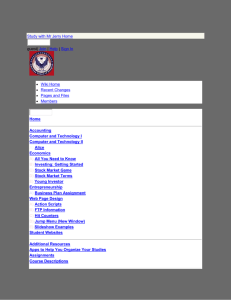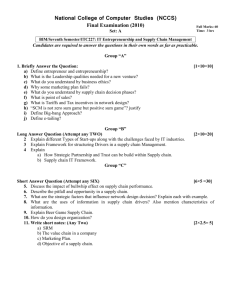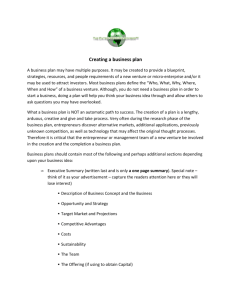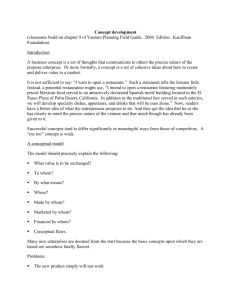Syllabus - Stevens Institute of Technology
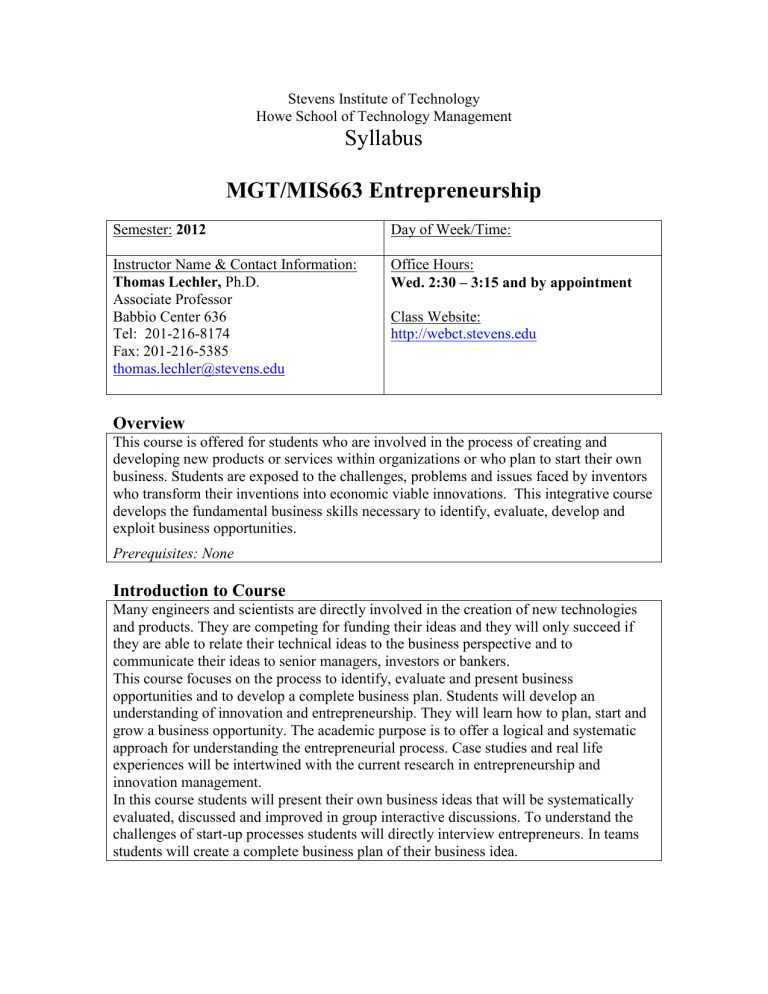
Stevens Institute of Technology
Howe School of Technology Management
Syllabus
MGT/MIS663 Entrepreneurship
Semester: 2012
Instructor Name & Contact Information:
Thomas Lechler, Ph.D.
Associate Professor
Babbio Center 636
Tel: 201-216-8174
Fax: 201-216-5385 thomas.lechler@stevens.edu
Day of Week/Time:
Office Hours:
Wed. 2:30 – 3:15 and by appointment
Class Website: http://webct.stevens.edu
Overview
This course is offered for students who are involved in the process of creating and developing new products or services within organizations or who plan to start their own business. Students are exposed to the challenges, problems and issues faced by inventors who transform their inventions into economic viable innovations. This integrative course develops the fundamental business skills necessary to identify, evaluate, develop and exploit business opportunities.
Prerequisites: None
Introduction to Course
Many engineers and scientists are directly involved in the creation of new technologies and products. They are competing for funding their ideas and they will only succeed if they are able to relate their technical ideas to the business perspective and to communicate their ideas to senior managers, investors or bankers.
This course focuses on the process to identify, evaluate and present business opportunities and to develop a complete business plan. Students will develop an understanding of innovation and entrepreneurship. They will learn how to plan, start and grow a business opportunity. The academic purpose is to offer a logical and systematic approach for understanding the entrepreneurial process. Case studies and real life experiences will be intertwined with the current research in entrepreneurship and innovation management.
In this course students will present their own business ideas that will be systematically evaluated, discussed and improved in group interactive discussions. To understand the challenges of start-up processes students will directly interview entrepreneurs. In teams students will create a complete business plan of their business idea.
Learning Goals
After taking this course, the student will be able to:
1.
Identify and recognize viable business opportunities.
2.
Critically evaluate business opportunities.
3.
Differentiate between small business and entrepreneurial opportunities.
4.
Develop a winning business model.
5.
Present effectively the business idea.
6.
Assess and obtain required resources.
7.
Manage growth of new ventures.
8.
Define exit strategies.
9.
Develop and write an effective business plan.
Pedagogy
The course will employ lectures, case studies, class discussions, six individual assignments, one exam and one team project. Every student has to develop five business ideas and present one business idea during the class. Students will critically evaluate and discuss the presented business ideas and prepared cases. Every student is required to conduct an interview with an entrepreneur and prepare a real life case analysis. In the final project, student teams will develop a complete and actionable business plan.
Required Text(s)
William D. Bygrave, ed.
The Portable MBA in Entrepreneurship , 4 th Edition. (New York:
John Wiley & Sons, 2009).
William D. Bygrave and Dan D’Heilly, eds.
The Portable MBA in Entrepreneurship
Case Studies , 2nd Edition. (New York: John Wiley & Sons, 1997).
All other materials used in this course are provided on WebCT.
Required Readings
Peter F. Drucker, Innovation and Entrepreneurship . (Harper Business, 2006)
Additional Readings
Robert D. Hisrich and Michael D. Peters, Entrepreneurship: Starting, Developing, and
Managing a New Enterprise , 5th Edition. (New York: Irwin-McGraw Hill, 2001).
Ernesto J. Poza, Smart Growth: Critical Choices for Continuity and Prosperity. (San
Francisco: Jossey-Bass Publishing Co., 1989.)
Robert D. Hisrich, ed. Entrepreneurship, Intrapreneurship, and Venture Capital .
(Lexington, KY: Lexington Books, Inc., 1986).
Donald L. Sexton and Raymond W. Smilor, eds., Entrepreneurship 2000. (Chicago:
Upstart Publishing Co., 1997).
2
Robert D. Hisrich and Candida Brush, The Woman Entrepreneur . (Lexington: Lexington
Books, Inc., 1986).
Mark Van Osnabrugge and Robert Robinson, Angel Investing . (San Francisco: Jossey-
Bass Publishing Co., 2000).
Assignments
The course assignments consist of four distinctive deliverables.
1. Class Participation
Class participation on all cases and discussions are essential to enhance the learning experience. Attendance in class sessions is an important component of this grade. Everyone is expected to have read the assigned material and participate actively in the lecture discussions.
2. Venture Business Idea Portfolio
This is an individual assignment. It is expected to develop a portfolio of five business ideas. The paper/electronic version should be less than 2 pages.
Please submit each idea online on WebCT in the following format. The name of the file should be: FirstIdea_LastName; SecondIdea_LastName; ThirdIdea_LastName;
FourthIdea_LastName; FifthIdea_LastName.
This assignment should be conducted solely by each individual student!
3. Elevator Pitch
One out of the five ideas has to be presented. The presentation of the business idea must be no longer than 2 minutes, in front of the class. The use of slides is not permitted.
4. Real Life Venture Analysis
You are asked to become acquainted with founders of a technology-driven new venture business that was formed within the past five or six years, and to prepare, through a personal interview, a report in the following sequence:
1.
Together with the entrepreneur, complete the questionnaire provided in the class.
2.
Write one page profile of the company’s present status.
3.
Write one page about the critical development stages and decisions concerning the venture’s start-up and growth
4.
Write one page describing the personal characteristics of the entrepreneur.
Particularly emphasize on the source of his/her motivation to create and exploit a business opportunity.
5.
Write one page describing how the entrepreneur became familiar with the target market. How is the professional background related to the market and technical knowledge necessary to develop the business idea?
3
6.
Write one page describing and evaluating the venture’s initial business idea.
Compare the initial business idea with the actual business idea. Did the idea change over time? What were the reasons for the changes?
This assignment should be conducted solely by each individual student!
5. New Venture Business Plan
A complete and comprehensive business plan has to be delivered as part of a team effort. The team consists of max. two students. The business idea could be selected from the presented individual ideas. The format of the business plan will be offered in the course.
Submission of Assignments
All assignments have to be submitted in electronic form to the following email address: tlechler@stevens.edu
. Assignments will be only accepted if they were submitted within the due date.
Assignments
1.
Class Participation (individual)
2.
Elevator Pitch (individual)
3.
Five Venture Business Ideas (individual)
4.
Real Life Venture Analysis (individual)
5.
New Venture Business Plan (team max 2)
6.
Exam
Total Points
Grade
Points
100
100
200
200
200
200
1000
A
1000 –
950
A-
949 –
900
B+
899 –
867
Letter Grade Scheme
B
866 –
834
B-
833 –
800
C+
799 –
767
C
766 –
734
C-
733 –
700
F
699 –
0
... the instructor reserves discretion to drastically grade down for a) poor writing b) poor team participation c) delayed submission
4
Ethical Conduct
The following statement is printed in the Stevens Graduate Catalog and applies to all students taking Stevens courses, on and off campus.
“Cheating during in-class tests or take-home examinations or homework is, of course, illegal and immoral. A Graduate Academic Evaluation Board exists to investigate academic improprieties, conduct hearings, and determine any necessary actions. The term ‘academic impropriety’ is meant to include, but is not limited to, cheating on homework, during in-class or take home examinations and plagiarism.“
Consequences of academic impropriety are severe, ranging from receiving an “F” in a course, to a warning from the Dean of the Graduate School, which becomes a part of the permanent student record, to expulsion.
Reference: The Graduate Student Handbook, Academic Year 2003-2004 Stevens
Institute of Technology, page 10.
Consistent with the above statements, all homework exercises, tests and exams that are designated as individual assignments MUST contain the following signed statement before they can be accepted for grading.
____________________________________________________________________
I pledge on my honor that I have not given or received any unauthorized assistance on this assignment/examination. I further pledge that I have not copied any material from a book, article, the Internet or any other source except where I have expressly cited the source.
Signature ________________ Date: _____________
Please note that assignments in this class may be submitted to www.turnitin.com
, a webbased anti-plagiarism system, for an evaluation of their originality.
5
Course Schedule
The lecture topics could be changed in accordance to the possibility to invite guest speakers. Additional readings will be submitted in class.
WEEK Date
1
2
3
4
5
6
7
8
9
10
11
12
13
14
Probable Lecture Topic
09/12/11 Introduction to Entrepreneurship
Defining Entrepreneurship
Entrepreneurship and its economic importance
Entrepreneurship in the light of economic theory
Invention vs. Innovation
09/19/11 Business Opportunity Components
Technology Innovations
Market Innovations
Business Models Innovations
09/26/11 Business Opportunity Evaluation &
Communication
Evaluation criteria of business opportunities
Presenting business opportunities
10/03/11 Business Opportunity Sources
Sources of business opportunities
10/11/11 Elements of Start-up Strategy
Defining a mission and vision
10/17/11 Elements of Start-up Strategy
Technology strategy and the management of IP
Midterm Exam
10/24/11 Elements of Start-up Strategy
Market Strategy (e.g. Competitive analysis, customer verification, pricing)
10/31/11 Financial Analysis
Sources of finance
11/07/11 Financial Analysis
Cash flow & NPV projections
11/14/11 The Role of the Entrepreneur
Analyzing the specific situations of entrepreneurs
Personal traits of successful entrepreneurs
Building the Management Team
11/21/11 Business Plan Analysis
- Business plan evaluation
- Business plan as a selling document
11/28/11 Growth Strategies
Market activities
Technological innovation activities
Management activities
Exit strategies
12/05/10 Presentations
In class business plan presentations
Presentation & Discussion of Business plan issues
12/12/10 Submission of business plans
Deliverable
1. Venture idea Bygrave 2,3
2. Venture idea Drucker, I.2 –
I.11
3. Venture idea Drucker III.16–
III.19
4. Venture idea Bygrave 11
5. Venture idea Bygrave 7, 8
Drucker II.12-
II.15
Real life case
Bygrave 6
Bygrave 1
Team formation
Business plan sketch
Business plan due
Reading for this class
Bygrave 1,
Drucker Intro, 1
Chesbrough
Paper
Bygrave 4
Bygrave 5
Koeller, Lechler
Paper
Bygrave 13
6


